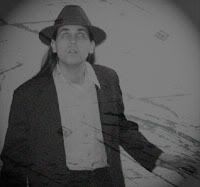So, my father thinks it's foolish to believe parts of the Christian bible were written, originally, in Greek. You know, despite the insistence of western Europe upon Greek and Latin, and the textual evidence, and, essentially, facts.
To start at the start - a guy appeared on the Colbert Report, touting his book, Misquoting Jesus. It sounds interesting, actually - it's all about the textual errors, mis-translations, and legerdemain involved in the bible. My father can't see this as anything other than an attack on Christianity - he called the author a "false prophet." I'm not kidding here, those are the words he used.
Aside: he did agree the president is also a "false prophet." All right then.
Anyway. He also told me that it's my right to believe in Hindu, or whatever, but I'll "pay for it one day." That's - super, dad. Way to be supportive - and sane.
I'm not even interested in HInduism. Somehow he can believe Native Americans were fine, but everyone else went to Hell if they didn't convert. I'm not sure how this makes sense. He doesn't even have a logic, here. I've met people with insane logic, but at least there was a line of reasoning. In a way. Probably.
It hurts my brain that less than a month ago my father was kvetching about, essentially, Telephone.
If you don't remember, or never played it, Telephone is an elementary/middle school game, where someone - usually the teacher - tells someone something. That person turns in his or her seat and whispers it to the person behind. That person turns, &c. It goes up and down desk rows, to keep the players close to one another. At the end, the final student tells the teacher what he or she heard, and it's never what the teacher whispered to the first student.
Now, with that reference explained: my father was going on (and on - he tends to do this) about how people can't be trusted to pass things along. I think he might have been attacking my tendency to ignore television news and just read web sites, but then again, maybe not (this time, anyway).
So. He thinks it's impossible for people to relay anything like news around in the span of an hour, or a day, but he thinks it's possible for scholars, scribes, and kings to keep a bunch of writings pure through thousands of years, hundreds of versions, and half a dozen languages. No, no, I understand, that makes perfect sense.
~
On another topic: I finished The System of the World this morning, by Neal Stephenson. I started this trilogy over two years ago - I spotted the second book in a bookstore, signed in the first edition by the author. So I bought it, because I well love Stephenson's writing, and the first book as well.
These books are huge. They are no less than 800 pages, and that's in full-size hardcover. They're brilliant, but sometimes bits would drag on, and this past week or so the book's felt like an albatross dangling from my collar. They just take so long to read. I thought I'd read a bit before I went to bed this morning - this was at about 2:30. It was over the event horizon - technically, that's where matter can no longer escape the pull of a black hole. It's also what I call the point in a good book where a reader can't stop, no matter what happens around him or her. So I read until 5:30, when I finished the book, stumbled around the house, and went to bed in the dim pre-dawn.

